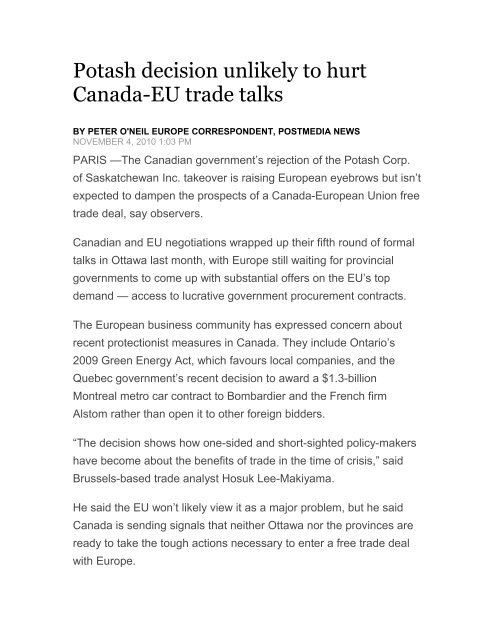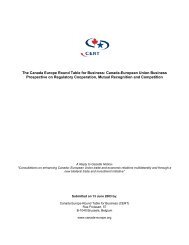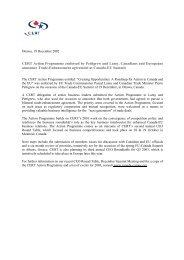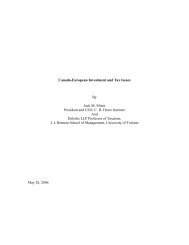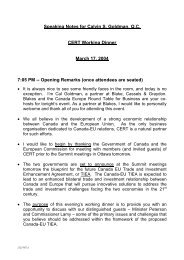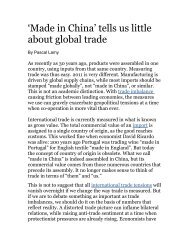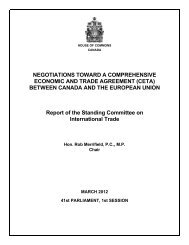Potash decision unlikely to hurt Canada-EU trade talks
Potash decision unlikely to hurt Canada-EU trade talks
Potash decision unlikely to hurt Canada-EU trade talks
Create successful ePaper yourself
Turn your PDF publications into a flip-book with our unique Google optimized e-Paper software.
<strong>Potash</strong> <strong>decision</strong> <strong>unlikely</strong> <strong>to</strong> <strong>hurt</strong><strong>Canada</strong>-<strong>EU</strong> <strong>trade</strong> <strong>talks</strong>BY PETER O'NEIL <strong>EU</strong>ROPE CORRESPONDENT, POSTMEDIA NEWSNOVEMBER 4, 2010 1:03 PMPARIS —The Canadian government’s rejection of the <strong>Potash</strong> Corp.of Saskatchewan Inc. takeover is raising European eyebrows but isn’texpected <strong>to</strong> dampen the prospects of a <strong>Canada</strong>-European Union free<strong>trade</strong> deal, say observers.Canadian and <strong>EU</strong> negotiations wrapped up their fifth round of formal<strong>talks</strong> in Ottawa last month, with Europe still waiting for provincialgovernments <strong>to</strong> come up with substantial offers on the <strong>EU</strong>’s <strong>to</strong>pdemand — access <strong>to</strong> lucrative government procurement contracts.The European business community has expressed concern aboutrecent protectionist measures in <strong>Canada</strong>. They include Ontario’s2009 Green Energy Act, which favours local companies, and theQuebec government’s recent <strong>decision</strong> <strong>to</strong> award a $1.3-billionMontreal metro car contract <strong>to</strong> Bombardier and the French firmAls<strong>to</strong>m rather than open it <strong>to</strong> other foreign bidders.“The <strong>decision</strong> shows how one-sided and short-sighted policy-makershave become about the benefits of <strong>trade</strong> in the time of crisis,” saidBrussels-based <strong>trade</strong> analyst Hosuk Lee-Makiyama.He said the <strong>EU</strong> won’t likely view it as a major problem, but he said<strong>Canada</strong> is sending signals that neither Ottawa nor the provinces areready <strong>to</strong> take the <strong>to</strong>ugh actions necessary <strong>to</strong> enter a free <strong>trade</strong> dealwith Europe.
Toron<strong>to</strong> <strong>trade</strong> lawyer Milos Barutciski said the <strong>Potash</strong> Corp. rejectionwon’t, on its own, cause a foreign investment chill given that theoverwhelming majority of foreign takeovers in <strong>Canada</strong> breeze throughwith no resistance.“These <strong>decision</strong>s tend <strong>to</strong> be one-offs and <strong>Canada</strong> can point <strong>to</strong> thattrack record,” he <strong>to</strong>ld Postmedia News on Thursday.He warned, however, that Europe could view the <strong>decision</strong> morenegatively if it’s followed by a weak offer from <strong>Canada</strong> at the nextround of negotiations in January.“If it is stingy, the <strong>EU</strong> will question <strong>Canada</strong>’s commitment <strong>to</strong> realmarket liberalization. If it is ambitious, the <strong>Potash</strong> <strong>decision</strong> won’t bean issue.”Adrian Van Den Hoven, spokesman for the Business Europe lobbygroup, and Jason Langrish, of the <strong>Canada</strong> Europe Roundtable forBusiness, agreed the Harper government’s <strong>decision</strong> won’t have anegative impact on <strong>talks</strong>.Langrish said that it was not surprising that the government wouldblock the acquisition, given the growing global demand for potashand the sheer quantity of the resource in Saskatchewan.“<strong>Potash</strong> Corp. is an anomaly given its market share and importance<strong>to</strong> the Saskatchewan economy,” he said in an email.“If this was an iron ore company, this likely would not have becomethe s<strong>to</strong>ry it has become.”<strong>Canada</strong> and <strong>EU</strong> negotia<strong>to</strong>rs are attempting <strong>to</strong> strike a comprehensive
deal by next year covering areas such as procurement, tariffs,investment, services and intellectual property rights.But negotia<strong>to</strong>rs on both sides are wrestling with rising protectionistsentiment around the world as a result of the global economic crisis.Some critics have argued that the Ontario and Quebec governmentsin particular have been reluctant <strong>to</strong> open up procurement, while theCanadian Federation of Municipalities has expressed concern aboutpotential problems for cities.The Council of Canadians, meanwhile, has regularly denounced thedeal as bad news for Canadian workers and the environment.Business Europe’s Van Den Hoven said there were “<strong>to</strong>ughexchanges” in Ottawa last month.“Nothing concrete came out on procurement, our No. 1 issue, but theprovinces are talking positively about it.”Van Den Hoven said the <strong>EU</strong> also <strong>to</strong>ok a <strong>to</strong>ugh stand on intellectualproperty issues, accusing <strong>Canada</strong> of having insufficient copyrightprotection for pharmaceutical drugs and for products that have“geographic indica<strong>to</strong>r” names, like Parma ham, named after the city innorthern Italy.Langrish said he’s learned that <strong>Canada</strong> is preparing a “substantial”offer on procurement.


